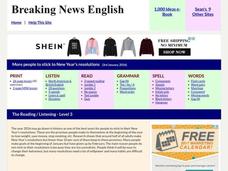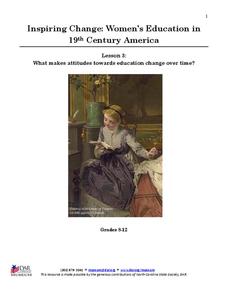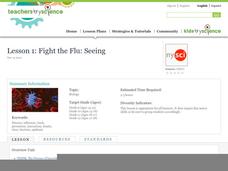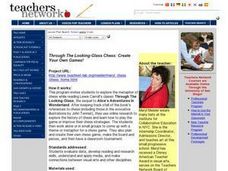West Virginia Department of Education
Harpers Ferry Letters
Scholars write letters as if they were someone who heard the story of John Brown's raid. The resource, a standalone, covers information from primary sources that is important to West Virginian history: the Harpers Ferry Letters.
Teach Engineering
Nanotechnology and Cancer Treatments
Information on the biomedical use of nanotechnology, specifically in the detection and treatment of cancer, is the focus of a lesson that seems like it is out of a science fiction novel. Pupils learn about electrophoresis, which is used...
Ford's Theatre
How Perspective Shapes Understanding of History
The Boston Massacre may be an iconic event in American history, but perhaps the British soldiers had another point of view. Using primary sources, including reports from Boston newspapers and secondary sources from the British...
Breaking News English
More People to Stick to New Year's Resolutions
What makes a good New Year's resolution? Practice goal-setting and reading comprehension with a set of language arts activities. English learners work on cloze passages, synonym matches, interviewing exercises, and comprehension...
National Society Daughters of the American Revolution
Lesson 3: What Makes Attitudes Towards Education Change over Time?
The struggle for women's rights is not unique to this generation, or even to the 20th century. Class members explore the conflicting opinions of Alexander Graham Bell and his wife, Mabel Hubbard Bell, regarding women's pursuits of higher...
Kenan Fellows
Making Connections with Water Quality
What's in your water? And, why is water quality so important? Enhance your class's level of water appreciation through a lesson that demonstrates the necessity of water quality. Environmental enthusiasts explore the EPA's Clean Water...
Newseum
Can I Trust the Creators?
It's easy to find information at the click of a mouse, but is it trustworthy? Pupils learn about the E.S.C.A.P.E. acronym for evaluating sources. Next, learners read a news story and evaluate its sources to determine credibility. Last,...
TPS Journal
Sourcing a Document: The First Thanksgiving
How reliable is a painting of the first Thanksgiving if it was created 300 years after the fact? Learners assess the validity of a primary source image to determine what it can actually reveal about this event.
Maine Math & Science Alliance
Earth as a System
Ecosystem, human body system, weather system. We hear the word system a lot, but what does it really mean? In the activity, pairs or groups of learners discuss how a bicycle is a system and then analyze objects in their classroom and...
Curated OER
Lesson 1: Fight the Flu: Seeing
The flu has been a deadly epidemic many times in the past. By examining technological innovations throughout history, then simulating the spread of disease from person to person through a classroom investigation, and finishing up with...
Scholastic
Hillary Conquers Everest
If a field trip to the summit of Mount Everest isn't in your school budget, make the trek virtually! An interactive lesson allows class members to follow Sir Edmund Hillary and Tenzing Norgay's trail up the mountain, and provides...
Baylor College
Comparing Sizes of Microorganisms
Kids compare what printed text looks like with the naked eye and under magnification. They discuss the extremely small scale that must be used to measure the size. They learn about the micrometer unit, then draw scale models of a variety...
Practical Money Skills
Protecting Your Money
How can you tell if a commercial or salesperson is being misleading? Encourage your learners to protect themselves and their money with a instructional activity about consumer rights. They review laws that keep consumers safe from faulty...
NOAA
Vertebrates II
Mammals of the ocean unite! Or not. The 20th installment of a 23-part NOAA Enrichment in Marine sciences and Oceanography (NEMO) program investigates how warm-blooded marine mammals survive in water. In the class activity, learners use...
Scholastic
Lesson One: The Earth, Background and Glossary
How much do you really know about our planet? Middle schoolers build up their prior knowledge about Earth, its placement in the solar system, its composition, and important geological vocabulary with an introductory earth science lesson...
California Academy of Science
Nuclear Energy: What's Your Reaction?
OSHA confirms that rules governing worker safety at nuclear power plants ranks higher than worker safety in offices. Scholars must consider safety, cost, alternatives, and other factors before recommending whether a town should build a...
Curated OER
Seeking, Locating, Accessing, and Using Information
Students complete reserach on a topic of their choice by following the Big Six research program. In doing so, students locate information and assess the validity and usefulness of sources.
Curated OER
Exploring Canadian Heritage
Students use the online Atlas as a research tool to find information on national parks and world heritage sites.
Curated OER
Memorials and Meaning
Students explore the Civil War. In this Civil War lesson plan, students collaborate to research the war. They examine Matthew Brady photographs that inspire them to create a memorial to honor those who served in the Civil War.
Curated OER
Spot the Leaf: Identifying Plants in Works of Art
Students explore the leaf as a design motif in art. They conduct Internet research on leaf and tree symbolism, view and discuss artwork, and create an original work of art featuring a leaf or leaf motif.
Curated OER
Discovering My Family History
Students research their family trees. They research Internet sites, conduct interviews and, when possible, access primary sources to compile information about their family's history. Students present their findings in a family tree.
Curated OER
Through the Looking-Glass Chess: Create Your Own Games!
Sixth graders research chess in relation to the metaphors in Lewis Carroll's Through the Looking-Glass. They read the novel and note references to chess and research the history of chess and how to play the game. In groups, they create...
Curated OER
Ground Level Ozone
Students analyze real-time data and predict the level of ground ozone in their home city. They measure the level of ground ozone, submit their data to an online collaborative project, and create a web page presenting the dangers of...
Curated OER
Prayers for Paankhenamun
Learners use the internet to research one of six Egyptian gods and goddesses of the afterlife. They focus on physical attributes, symbols associated with and the role played by that deity into the afterlife. They write a letter to their...

























